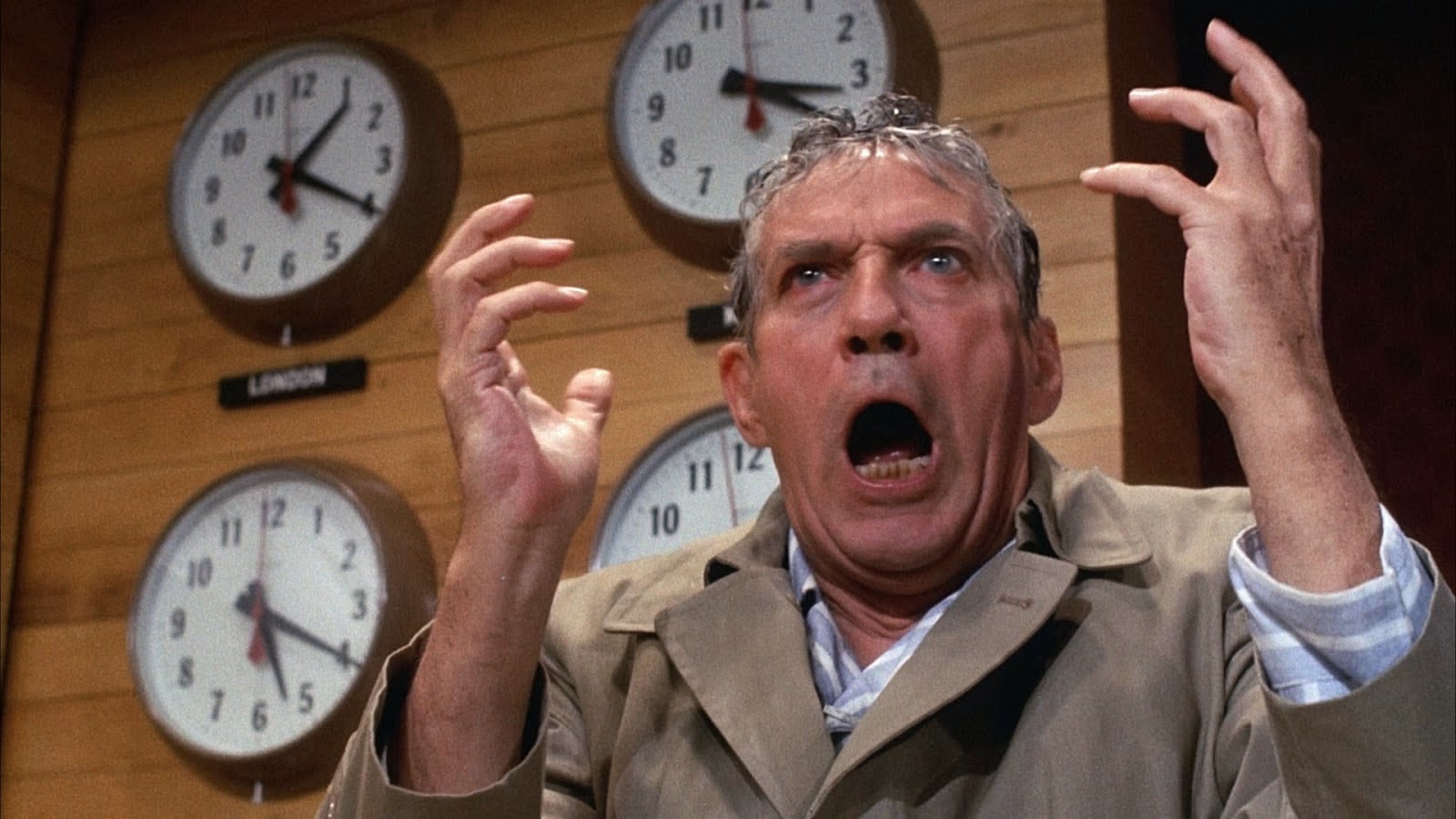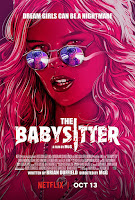Network
Network
(1976)
A Review by Grant Kanigan
Directed by: Sidney Lumet
Written by: Paddy Chayefsky
Starring: William Holden, Peter Finch,
Robert Duvall, Faye Dunaway
Rating: PG
Release Date: November 27th, 1976
 |
| Peter Finch in Network |
Network follows two veterans of the news media industry. Like the Cronkite or Murrows of their time, Howard Beale and Max Schumacher, (Peter Finch and William Holden), are willing to rest on their laurels and watch the younger crowd take the reigns. However, when the new producer, Diana Christensen, (Faye Dunaway), takes over, she begins to take the Network news in a different direction. Once Beale's old school persona becomes old hat, and he's fired, the change in atmosphere in the news room leads Beale to a psychological break that ends with him storming the news room and telling sixty million people he's mad as hell. Seeing a spike in publicity, ratings and ad revenue, Christiensen re-hires Beale and continues to air his madness. Only Christensen and Schumacher are aware of Beale's actual mental state, and begin psychological warfare over the ethics of airing Beale's insane rants.
Sidney Lumet was one of the best directors of his generation. Inclined to the theatrical side of filmmaking, (i.e., the stage, not the cinema), his first theatrical release still stands as one of the best films of all time - challenging social mores and the complexity of decision making - with 12 Angry Men. From 1957 to his death in 2011, Lumet was challenging audiences with his ethically ambiguous and socially relevant work. His last film, Before the Devil Knows You're Dead, was also one of his best. Network, while dated in some respects, still holds true at its core. It's cruel and cynical satirization of news culture was eerily prophetic. The 24 hour news cycle we now live in is damaging to our culture. With talking heads like Glenn Beck, Bill O'Reilly and Michael Moore spouting political talking points, verbal diarrhoea and vapid verbiage, the real messages of our time are lost in a tsunami of pseudointellectual garbage. As well, such incessant gnawing at the 'truths' of culture lead to an impossible infallibility of our cultural heroes. I have no doubt Cronkite and Murrow, or the celebrities of the time, Welles or Brando had their fare share of drunken escapades or truth stretching. Yet, in today's day and age, the simplest of lies can lead to Brian Williams' firing, or the inebriated explorations of Shia LeBeouf can turn him into a national laughingstock. We've all stretched the truth, and we've all had our fare share of crazy nights. Most of us don't have sixty million people watching us. The 1976 world of Network has grown into a gargantuan beast. Lumet might not have known how far the media would go in search of ratings, but he was on the right path.
With a searing screenplay by Paddy Chayefsky, (Marty), and a superb cast, Lumet's film is razor sharp. Faye Dunaway, playing the sociopathic Christensen, is ferociously evil, and hard to watch. It's a hell of a performance. With roles in Chinatown, Network, and Bonnie & Clyde, its a wonder as to why she didn't have more higher profile roles following her work in the 1960 and 70's. Robert Duvall, as her boss as well as right hand man, is, as usual, fantastic. William Holden, and especially Peter Finch, are spellbinding. With both of their lives ending within the decade following Network's release, it's fitting that they bookended their careers with such powerful work. With Network's powerful message that gets more and more relevant every day, it's a film featuring performances that won't be quickly forgotten.
Overall, Beale, while compelling, is a broken man. Fighting against the proverbial dying of the light, the inevitable march towards death every person must face, Beale refuses to take life as is. He wants more, and he doesn't want accept death without a fight. Yet, this ignorance is a willingness to avoid the fleeting nature of life, the importance of seizing moments, and the hard choice to enjoy what you have while you have it. Dunaway and Duvall's characters seize on this wilful ignorance, as it's an ignorance most deal with every day, (it's a tough truism, it's no wonder religion is so popular), and is therefore highly marketable. Yet, in the end, Beale's rantings and the Network's escapades, (much like modern day cable news stations), become the sad joke of life as Shakespeare illustrates in Macbeth:
"Life's but a walking shadow, a poor player that struts and frets his hour upon the stage and then is heard no more: it is a tale - told by an idiot - full of sound and fury, signifying nothing"
Grant's Rating: 5/5 Stars
Peter Finch in Network: "Mad as Hell"



Comments